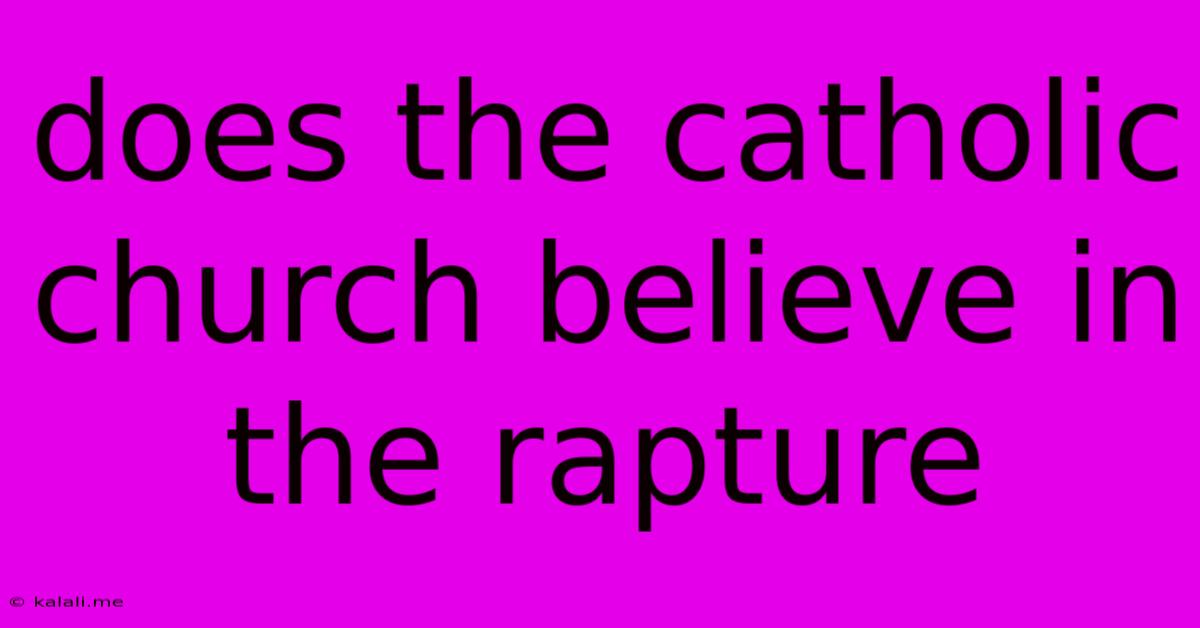Does The Catholic Church Believe In The Rapture
Kalali
Jun 08, 2025 · 3 min read

Table of Contents
Does the Catholic Church Believe in the Rapture? Understanding End Times in Catholic Theology
The question of whether the Catholic Church believes in the rapture, as depicted in popular evangelical interpretations, is a complex one. The short answer is: no, not in the same way as some Protestant denominations. While Catholic theology anticipates a final judgment and the return of Christ, the understanding of this event differs significantly from the pre-tribulation rapture scenario commonly portrayed in certain Protestant circles. This article will explore the Catholic perspective on the end times, clarifying the distinctions and highlighting key beliefs.
Understanding the Protestant Pre-Tribulation Rapture
Before delving into the Catholic view, it's crucial to define the Protestant pre-tribulation rapture. This belief posits that before the tribulation period – a period of intense suffering and persecution described in the Book of Revelation – true believers will be secretly "raptured" or taken up to heaven to avoid the coming hardships. This event is often seen as a distinct and separate event preceding the Second Coming of Christ.
The Catholic Perspective on the End Times
Catholic teaching on the end times draws heavily from Scripture, particularly the Gospels and the Book of Revelation, but interprets them within the broader context of tradition and magisterial teachings. While the Church acknowledges the reality of a final judgment and the return of Christ, it doesn't subscribe to a pre-tribulation rapture. Instead, Catholic theology emphasizes several key points:
-
The Parousia: Catholics believe in the Parousia, the Second Coming of Christ, which will be both visible and glorious. This event will mark the end of the world as we know it and the commencement of the final judgment.
-
General Judgment: Following the Parousia, a general judgment will occur, where all people will be judged by Christ according to their deeds and faith. This judgment will determine their eternal destiny.
-
No Secret Rapture: The concept of a secret rapture before a period of tribulation isn't part of Catholic doctrine. The return of Christ is envisioned as a public and universally witnessed event.
-
Emphasis on Eschatological Vigilance: Catholic teaching stresses the importance of living a life of faith and readiness for Christ's return. This preparedness involves living a virtuous life, engaging in acts of charity, and remaining vigilant in prayer. However, this vigilance doesn't necessitate a belief in a secret pre-tribulation event.
Key Differences and Similarities
The core difference lies in the timing and nature of Christ's return. Protestant pre-tribulation rapture theology emphasizes a secret removal of believers before a period of great tribulation, while Catholic theology anticipates a visible and glorious return at the end of time, encompassing a final judgment.
Despite these differences, both Catholic and Protestant traditions share a common belief in:
- The Second Coming of Christ: Both traditions firmly believe in the ultimate return of Christ.
- Final Judgment: Both acknowledge a final judgment where all will be judged according to their actions.
- Eternal Life: Both believe in the promise of eternal life for the faithful.
Conclusion: A Matter of Interpretation
The question of whether the Catholic Church believes in the rapture hinges on the definition of "rapture." If "rapture" refers to a secret pre-tribulation removal of believers, then the answer is a definitive no. However, if "rapture" is understood as the ultimate return of Christ and the gathering of the faithful, then the answer is a resounding yes, but within the framework of Catholic eschatology, which emphasizes the visible Parousia and the subsequent general judgment. The differences stem from varied interpretations of biblical prophecy and the development of theological traditions within different branches of Christianity. Understanding these nuances is crucial for respectful interfaith dialogue and a deeper appreciation of diverse theological perspectives.
Latest Posts
Latest Posts
-
Volume Of Sphere By Triple Integration
Jun 08, 2025
-
What If A Discord Has No Mods
Jun 08, 2025
-
In The Cloud Or On The Cloud
Jun 08, 2025
-
Breaking All The Rules Of God In Man Meaning
Jun 08, 2025
-
What Does Open Ground Mean On An Outlet
Jun 08, 2025
Related Post
Thank you for visiting our website which covers about Does The Catholic Church Believe In The Rapture . We hope the information provided has been useful to you. Feel free to contact us if you have any questions or need further assistance. See you next time and don't miss to bookmark.